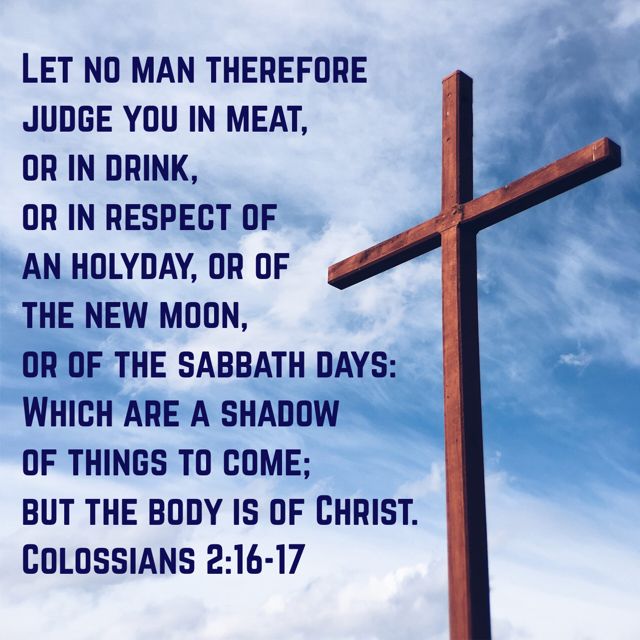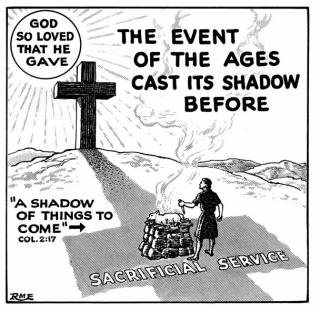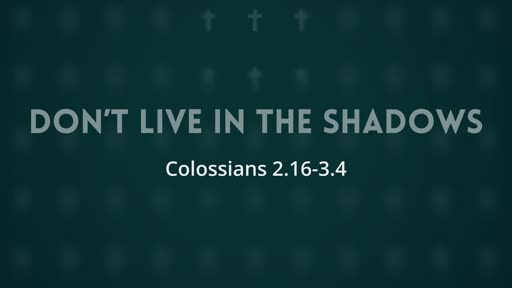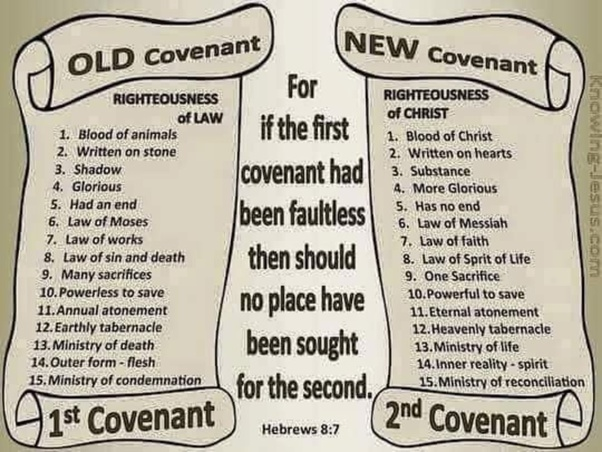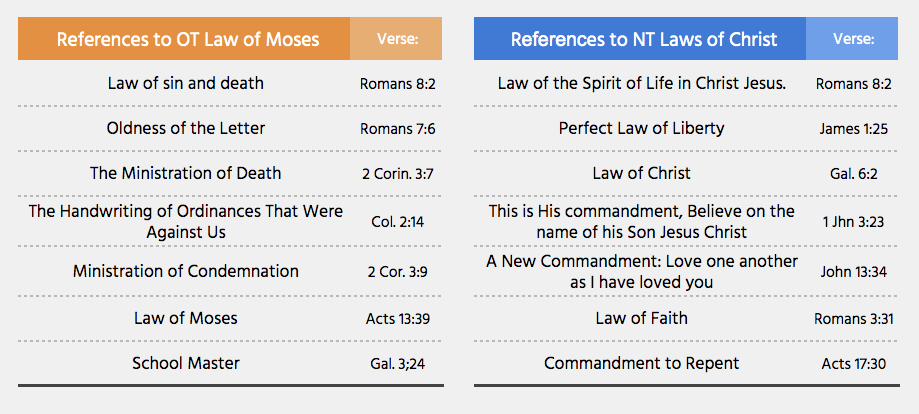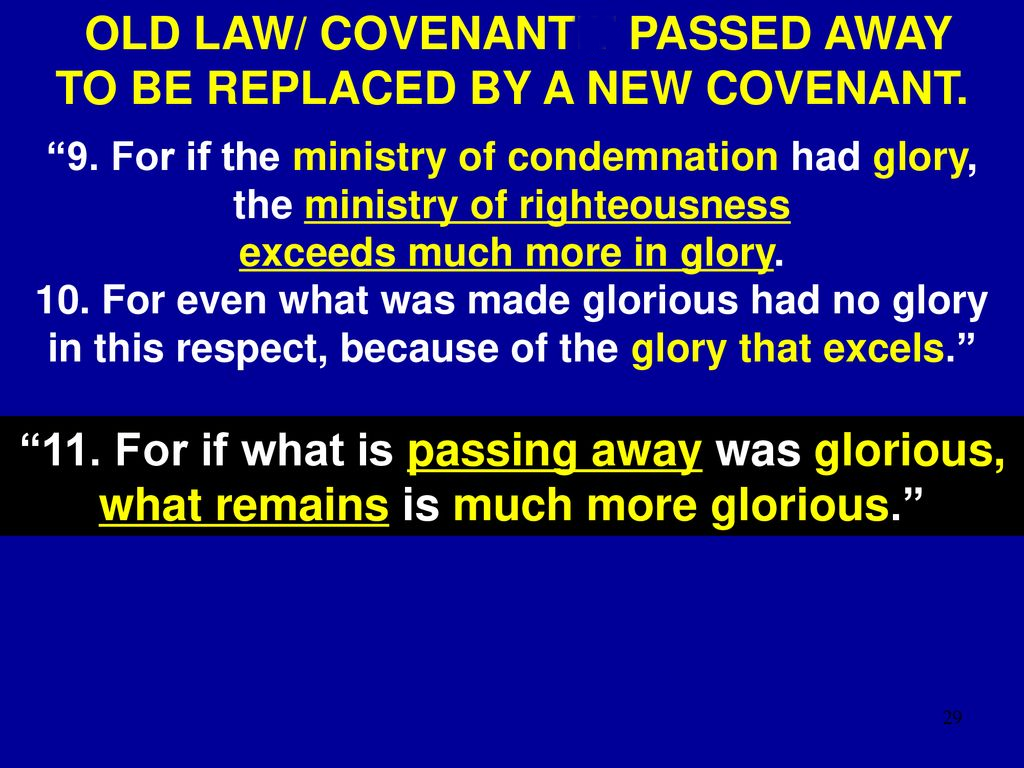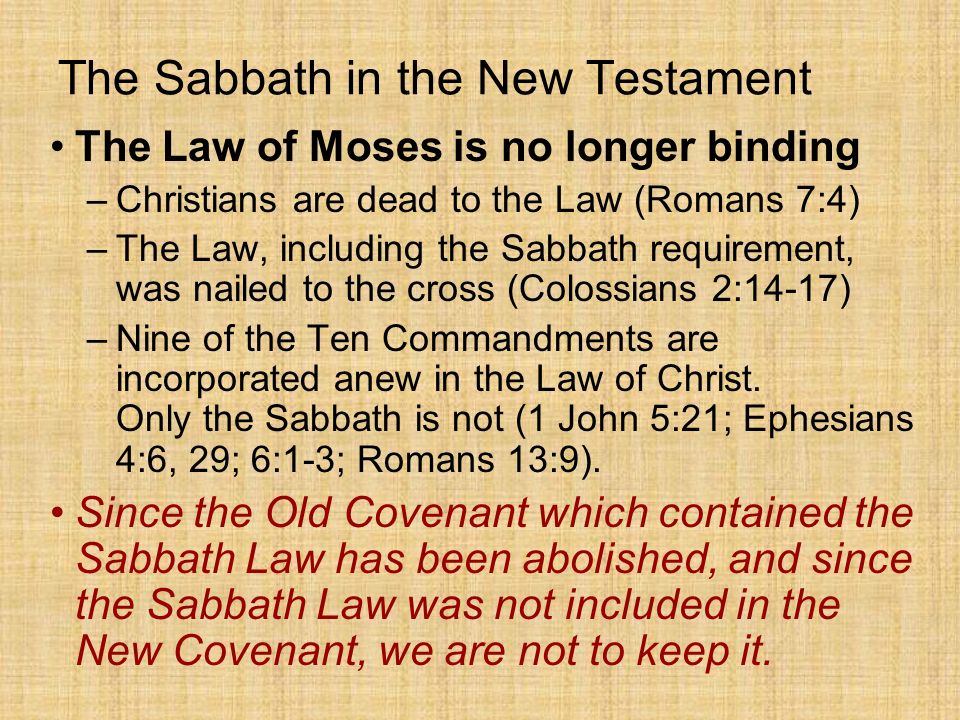Dear friends in the Lord JESUS,
Sadly many do not know the difference between the Old Covenant and what the old covenant is and what the new covenant is that the old covenant pointed to and that is fulfilled in the new covenant. They mix up the laws of Moses written in the book of the covenant *EXODUS 24:10 with the eternal law of God's 10 commandments written on tables of stone which is the work of God alone written with the finger of God alone that the NEW COVENANT scripture teach are the moral standard of GOOD and EVIL; Sin and Righteousness *ROMANS 3:20; ROMANS 7:7; 1 JOHN 3:4. These same NEW COVENANT scriptures teach us that if we break anyone of God's 10 commandments we stand guilty before God of sin *JAMES 2:10-11. Sin is defined in God's Word (new covenant) as breaking anyone of God's 10 commandments *1 JOHN 3:4; JAMES 2:10-11 and not believing and following God's Word *ROMANS 14:23. According to the scriptures all those who knowingly continue in known unrepentant sin after they have been given a knowledge of the truth of God's Word will not enter into the kingdom of God because they reject the gift of Gods dear son and count the blood of the covenant an unholy thing doing despite to the Spirit of God's grace *HEBREWS 10:26-31.
A careful study of the scriptures from God's Word will show all who are seeking to believe and follow JESUS that it is the "Shadow laws" from the Mosaic book of the covenant *EXODUS 24:7, not God's 10 commandments that are written on stone that have been fulfilled in Christ and God's plan of salvation for mankind.
The religious teachers of today will try and tell you that God's 10 commandments are the old covenant that is abolished because they do not understand the old covenant laws and the difference between the Mosaic book of the Old covenant and law of Moses that were shadows of things to come (eg the ceremonial sanctuary laws, animal sacrifices and sin offerings, the Levitical Priesthood, the Sanctuary service and Feast days are all Mosaic laws that were written by Moses in the book of the old covenant *EXODUS 24:7. These are the "shadow laws" for remission of sin pointing to JESUS and God's plan of salvation in the new covenant.
There is not one scripture in all of God's Word that says God's eternal law (10 Commandments) have been abolished and are no longer the standards for GOOD and EVIL; Sin and RIGHTOUESNESS. The same as there is not a single scripture that says Gods' 4th commandment has been abolished and we are now commanded to keep Sunday as a Holy day.
These religious teachers of the day do not understand that God's eternal law written on stand (10 commandments in the new covenant have the same role they always had, and that is to give us the knowledge of GOOD and EVIL; SIN and RIGHTOUESNESS. These are God's Word in the new covenant...
No one is saved by the Law of God (10 commandments) they are to give us the knowledge of what sin is when broken and righteousness when obeyed from the heart through love.
ROMANS 3:20 [20], Therefore by the deeds of the law there shall no flesh be justified in his sight: for by the law is the knowledge of sin.
ROMANS 7:7 [7], What shall we say then? Is the law sin? God forbid. No, I had not known sin, but by the law: for I had not known lust, except the law had said, You shall not covet.
1 JOHN 3:4 [4], Whoever commits sin transgresses also the law: for sin is the transgression of the law.
PSALMS 119:172 [172] 172, My tongue shall speak of your word: for all your commandments are righteousness.
JAMES 2:10-11 [10], For whoever shall keep the whole law, and yet offend in one point, he is guilty of all.[11], For he that said, Do not commit adultery, said also, Do not kill. Now if you commit no adultery, yet if you kill, you are become a transgressor of the law.
Then we have these by JESUS and the Apostles all through the new testament scriptures...
WHAT DID JESUS AND THE APOSTLES TEACH ABOUT GOD’S LAW
(the scriptures below are no where near exhaustive)
Jesus taught the 10 commandments…..
1. Jesus kept God’s Law (10 commandments) and said the Law and the prophets would not pass away (Matthew 5:17-18)
2. Jesus taught others to follow the 10 commandments (
Mark 10:17-21)
3. Jesus taught that Love is the fulfilling (doing) of God’s Law (10 commandments Matthew 22:36-
40)
4. If we break God’s Law by following man-made traditions we are not following God (Matthew 15:3-9)
5. Jesus says if we commit sin we are a servant of sin and he has come to free us from sin (
John 8:32-36)
6. Jesus taught if you love God you will keep God’s Law and abide in His Love (
John 14:15; 15:10
7. If anyone is breaking any of God’s commandments and teaching others to do so will be called least in the kingdom of heaven <least = lost> (Matt 5:19)
8. No one can obey God’s Law producing the fruit of obedience of ourselves and unless we abide in Jesus we can do nothing (
John 15:4-10)
Paul affirms the Ten Commandments……
1. Paul teaches God's people keep the Sabbath
Hebrews 4.
2. Paul tells gentiles that "what matters is KEEPING the Commandments of GOD" 1 Corinthians 7:19
3. Paul tells gentiles "it is not the HEARERS of the Law that are just before God but the DOERS of the Law will be justified... on the day when according to my GOSPEL God will judge all mankind" Romans 2:13-16
4. Paul asks that gentiles consider the doctrine of LAW "Do we then make void the LAW of God by our faith? God forbid! In fact we establish the Law of God" Romans 3:31
5. Paul tells ALL Christians that it is only the lost who will "not subject themselves to the Law of God neither indeed CAN they" Romans 8:6-8
6 Paul reaches all Christians under the NEW Covenant that God's LAW as known in Jeremiah 31:31-33 is "written on the heart and mind" Hebrews 8:8-12
7. Paul tells all Christians that the OT text is to be used for Doctrine 2 Timothy 3:16 AND He never claims that "if I did not write it -- it is not scripture for us today" -- as one or two have imagined for us.
8. Paul tells all Christians that the 5th commandment is the "FIRST commandment with a promise" Ephesians 6:1-2 and is binding on all Christians.
9. God's Law (10 commandments) are holy, just and good (Romans 7:12)
10. God's Law gives us a knowledge of what sin is (Romans 3:20; 7:7)
11. The penalty of breaking God's Law without Jesus is death (Romans 6:23)
12. If we break God's Law we dishonor God (Romans 2:23)
13. If we sin we are "under the Law" and guilty before God (Romans 3:19)
14. We are saved by faith but our faith establishes the Law in us (Romans 3:31)
15. If we are saved by grace we should not break God's Law (Romans 6:1-7)
16. We should not break God's Law if we are under grace (Romans 6:15)
17. We are to serve the Law of God through the mind because that is where sin starts (Romans 6:17; 7:25; 8:4; 12:2)
18. It is God's Law that brings us to Jesus (Galatians 3:24)
19. God's salvation frees us from sin so we can be obedient to God's Law and live a life of holiness (Romans 6:22)
20. We will be judged by God's Law and only those that are obedient will be justified because of their faith (Romans 2:4-13)
21. God's Law can only be obeyed through love and a changed heart which comes by faith in God's Word (Romans 2:21-29; 13:9-10; Hebrews 8:10-12)
22. If we break God's Law and are in unrepentant sin we will be lost and will received God's judgements (Hebrews 10:26-27)
John affirms the 10 commandments……
1. John says it is only by keeping God’s 10 commandments that we know that we know God (
1 John 2:3)
2. If someone says that they know God and do not keep God’s 10 commandments they are lying and not telling the truth (
1 John 2:4)
3. We should purify ourselves as Jesus is pure (
1 John 3:3)
4. Sin is the breaking of God’s 10 commandments (
1 John 3:4)
5. Whoever is abiding in Christ does not commit sin (
1 John 3:6;
John 15:4-10)
6. If you are in unrepentant sin you have not seen Jesus or know him (
1 John 3:6)
7. John warns us that only those that are obedience to God’s Law are his true followers (
1 John 3:7)
8. If someone is committing unrepentant sin they are following the devil and not God (
1 John 3:7)
9. If you are born of God and abiding in him you will not commit sin (
1 John 3:9;
1 John 3:6;
John 15:4-10
10. It is the keeping of God’s commandments that is the difference between those that are following God and those that are not following God (
1 John 3:10;
1 John 5:3)
11. It is only by Love through faith that we can keep God’s commandments (
1 John 5:3-4)
12. God’s true believers in the end days will keep all of God’s commandments through faith in Jesus (Rev 14:12; 22:14)
James also affirms the 10 commandments…….
1. James says God’s Law (10 commandments) are a Royal Law (
James 2:8)
2. If we break one of God’s commandments we a guilty before God as sinners breaking all of God’s Law and gave some examples of breaking God’s Law (
James 2:9-11)
3. James says God’s Law is a law of liberty and freedom (
James 2:12)
4. The 10 commandments (God’s Law) are the standard in the judgment (
James 2:12)
5. If our faith does not have the fruit of obedience to God’s Law it is dead and not true faith (
James 2:16-26)
Peter affirms the 10 commandments……..
1. Sanctification is to obedience to God’s Law (1 Peter 1:2)
2. We can only be changed from sin to obedience to God’s Law by the power of God and it will be revealed in the last days (1 Peter 1:5)
3. We should give up our sins to be holy because Jesus is holy (1 Peter 1:13-16)
4. Jesus is your example who did no sin (1 Peter 2:21-22)
5. Cease from sin and do not live in the flesh (1 Peter 4:1-3)
6. Judgement will begin at the house of God and sinners (those breaking God’s 10 commandments) will not be saved.
7. God has given us his precious promises and as we believe them God will grant us his divine power to live a life of
Godliness (obedience to God’s Law; 2 Peter 1:2-4)
8. The
Un-Godly (disobedient to God’s Law) will be like Sodom and Gomorrah (2 Peter 2:6)
9. If any turn away from God’s Law and are in unrepentant sin breaking any of God’10 commandments they will be lost (2 Peter 2:20-22)
10 God is not willing that any should perish but that everyone should come to repentance and turn away from sin to follow God’s 10 commandments because those that do not will receive the judgements of God (2 Peter 3:5-14)
What did Jesus and the Apostles teach about the Sabbath in the New Testament?
1. It is lawful to do good on the Sabbath (Matthew 12:1-8; 10-12; 24:20;
Mark 3:1-5;
Luke 6:1-10; 13:14-16; 14:1-5;
John 7:22-23; 9:14;
Mark 1:21;
Mark 6:2;
Luke 4:16; 31;
Luke 14:1; 23:56)
2. Jesus made the Sabbath for all mankind (
Hebrews 1:2; John 1:1-3; 14; Ephesians 3:9; Colossians 1:16-17; Mark 2:27)
3. Jesus is Lord of the Sabbath (
Mark 2:28)
4. If you do not believe and follow God you cannot enter His Sabbath rest (
Hebrews 4)
5. It is one of God’s 10 commandments we break it we are guilty or breaking all (
James 2:8-12)
6. Breaking it is sin (
1 John 3:4)
7. God’s true followers keep it Holy as God commanded (Rev 14:12; Rev 22:14; Eze 20:20)
8. Jesus is our example and he kept the Sabbath (Matthew 12:1-8; 10-12; 24:20;
Mark 3:1-5;
Luke 6:1-10; 13:14-16; 14:1-5;
John 7:22-23; 9:14;
Mark 1:21;
Mark 6:2;
Luke 4:16; 31;
Luke 14:1; 23:56;
John 2:6; Matthew 16:24; 1 Corinthians 11:1; Ephesians 5:1-21; Pet 2:20-22)
9. The Apostle kept the Sabbath (Acts 13:14; 13:27; 13:44; 15:21; 16:13; 17:2; 18:4; Revelation 1:10)
God’s Law in the NC is written on our hearts it is through love and it is love the fulfils God’s Law in us as we walk not after the flesh but after the spirit and is why Jesus says f you love me keep my commandments. (
John 14:15;
John 15:10). If we knowingly break one of God’s commandments we commit sin (
1 John 3:4). This includes the 7th Day Sabbath which Jesus made for us and commands us to keep as a holy day.
...........
Now lets supply the context and the scriptures these religious teachers of today also leave out when sharing the scriptures with you.
ROMANS 3:31 [31], Do we then make void the law through faith? God forbid: yes, we establish the law.
ROMANS 8:4 [4], That the righteousness of the law might be fulfilled in us, who walk not after the flesh, but after the Spirit.
ROMANS 8:1 [1], There is therefore now no condemnation to them which are in Christ Jesus, who walk not after the flesh, but after the Spirit.
ROMANS 8:13 [13], For if you live after the flesh, you shall die: but if you through the Spirit do mortify the deeds of the body, you shall live.
GALATIANS 5:16 Walk in the Spirt and you will not fulfill the lusts of the flesh.
It is true dear friend the laws of Moses written by Moses are fulfilled in Christ and God's plan of salvation in the new covenant are no longer binding but God's Law (10 commandments) is still the standard of GOOD AND EVIL; SIN AND RIGHTEOUNESS according to the new covenant scriptures in ROMANS 3:20; ROMANS 7:7; 1 JOHN 3:4 and JAMES 2:10-11.
NOW let God's WORD alone tell us what exactly is the new covenant?
HEBREWS 8:10-12 [10], For THIS IS THE COVENANT THAT I WILL MAKE WITH THE HOUSE OF ISRAEL AFTER THOSE DAYS, SAID THE LORD;
I WILL PUT MY LAWS INTO THEIR MIND, AND WRITE THEM IN THEIR HEARTS: and I will be to them a God, and they shall be to me a people: [11], And THEY SHALL NOT TEACH EVERY MAN HIS NEIGHBOR, AND EVERY MAN HIS BROTHER, SAYING, KNOW THE LORD: FOR ALL SHALL KNOW ME, FROM THE LEAST TO THE GREATEST. [12], For I will be merciful to their unrighteousness, and their sins and their iniquities will I remember no more.
Don't let the Religious teachers of the day dear friends lead you away from God and his Word. Gods law is written on the heart in all those who are born again to love and love is the fulfilling of Gods' law in all those who believe and follow God's Word (ROMANS 13:8-10; MATTHEW 22:36-40).
Those who have been born again to love do not practice sin according to the scriptures which is defined as breaking anyone of God's 10 Commandments *1 JOHN 3:4; 1 JOHN 3:6-9. Sin is the difference between the children of God and the children of the devil according to the scriptures *1 JOHN 3:10; REVELATION 12:17; REVELATION 14:12; REVELATION 22:14.
There is no rest for those who knowingly break Gods 10 commandments as it is written the wicked are like the troubled sea, when it cannot rest, whose waters cast up mire and dirt. - ISAIAH 57:20.
The rest we receive in Christ is by learning of him and following him through his Word not by ignoring his Word, not believing his Word and not following what God says. *MATTHEW 11:28
May Gob bless you all as you seek him through his Word

